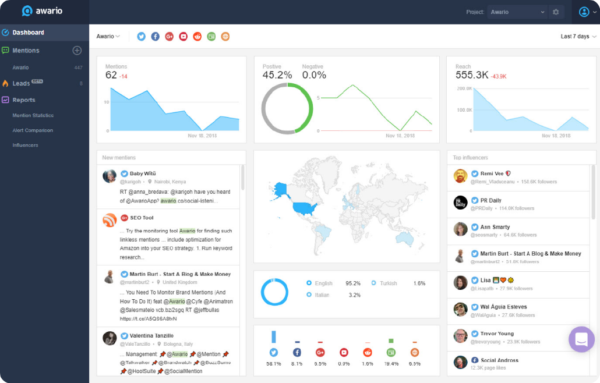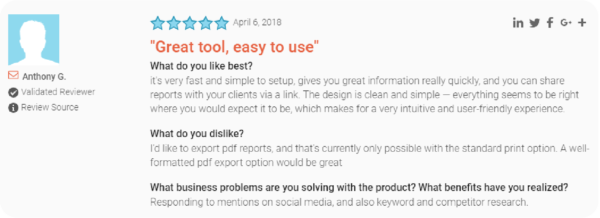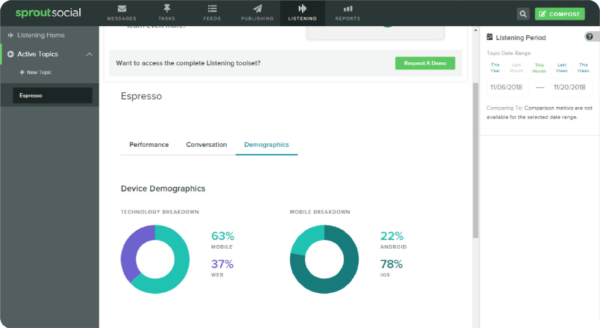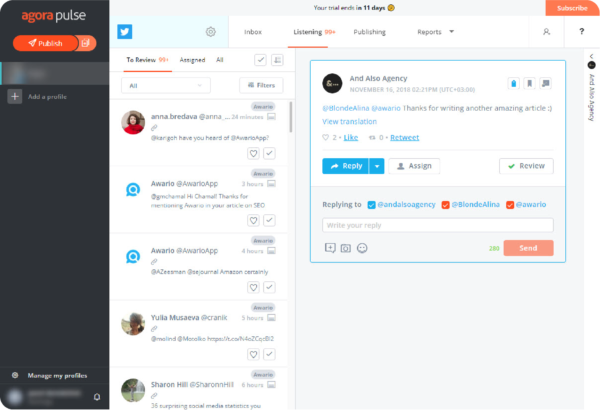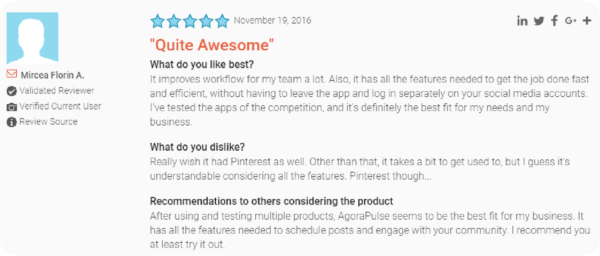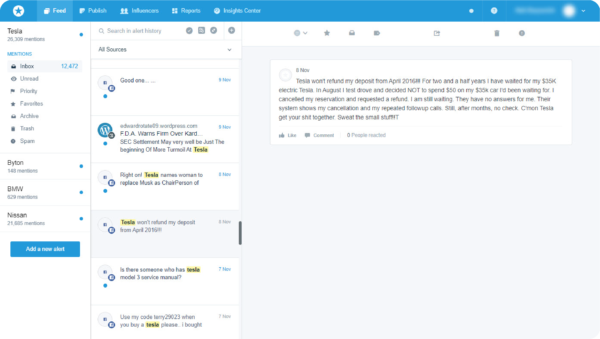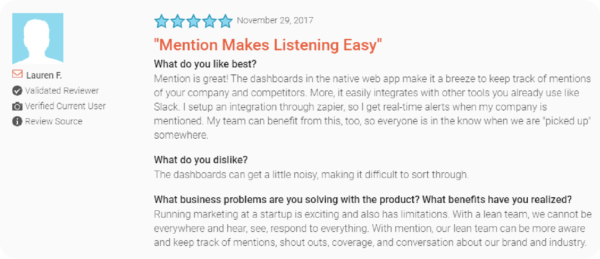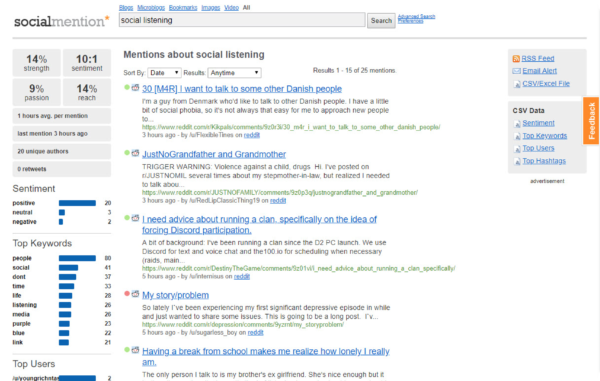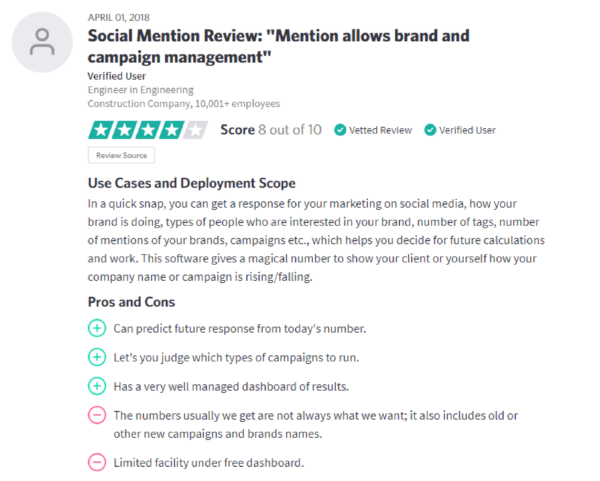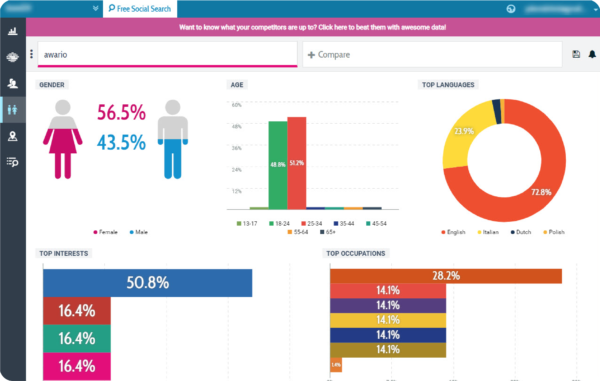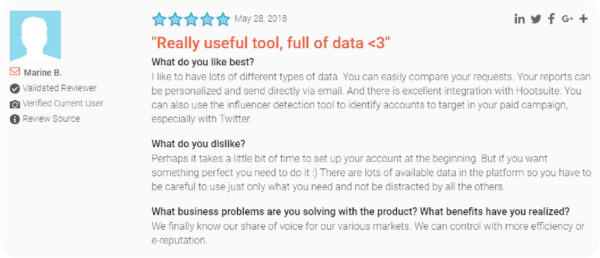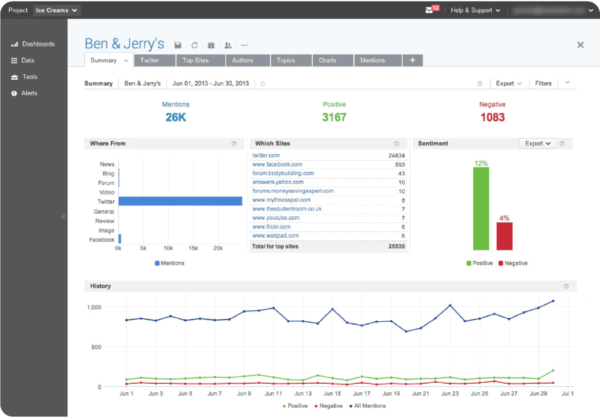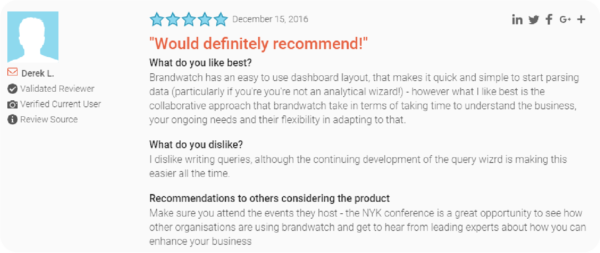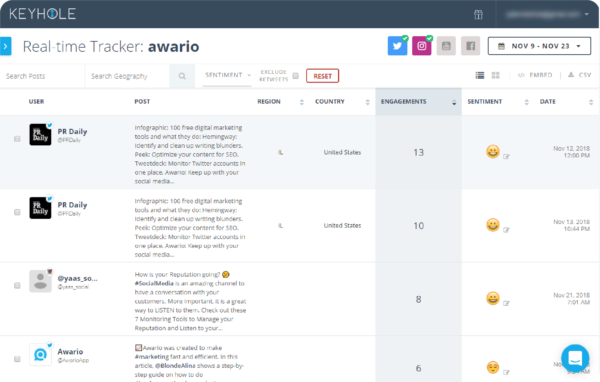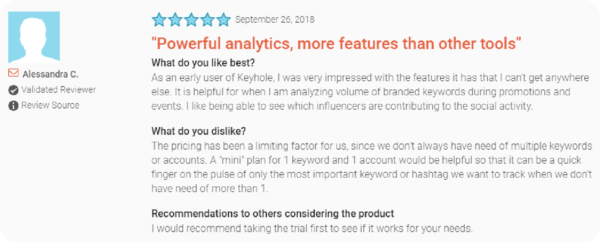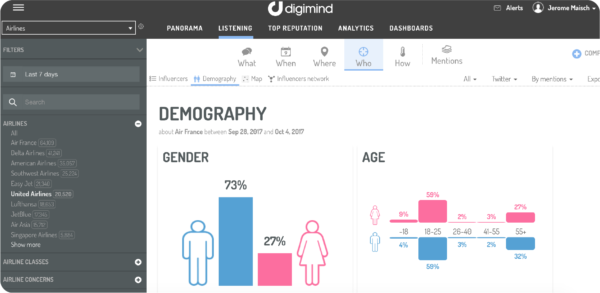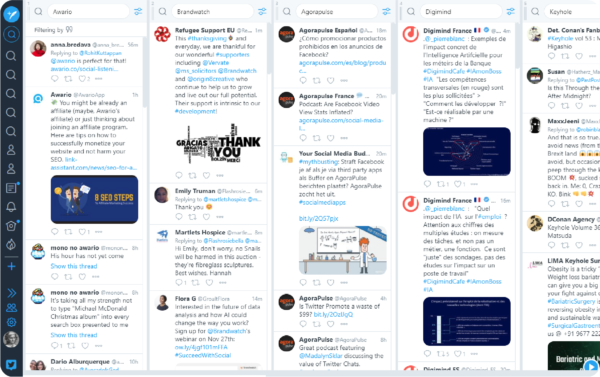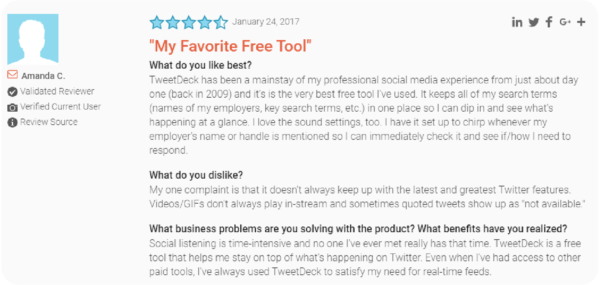Anything can go viral online. Be it a well-thought-out campaign or an absolutely random post. But of course, not everything that becomes discussed is good for your brand. Think of H&M’s controversial hoodie ads. Monitoring what people say about your brand in real time helps to tackle these issues even before they start.
Google Alerts is a free platform for monitoring the web. But the problem with Google Alerts is that it brings you web mentions only, completely ignoring social media, where most of the buzz happens. Luckily, there are lots of advanced tools that help you not only monitor social media but also spy on your competitors, get influencers and sales prospects. To make your life easier, we’ve tested the best Google Alerts alternatives and have come up with the list of tools to get you started.
1. Awario
Awario collects mentions of your brand(s), industry, competitors, brings you new influencers and sales prospects. The app is great for online reputation management, as it lets you interact with mentions from different sources without leaving the app. All users can set up a Boolean query, which helps collect more precise results. The reports section provides rich analytics such as top influencers, sentiment analysis, reach, etc.
Awario is rather new-to-the-game, but it’s rapidly developing. Most of the Enterprise-level features, such as shareable reports, white labeling, or data export are already implemented into Awario, but the prices are still very affordable.
Pricing: Before purchasing, you have 14 days to try the app. The Starter plan is $29, Pro is $89, Enterprise is $299. Purchasing an annual plan will save you 15%. The app is popular among small- to medium-size businesses.
Available platforms: Twitter, Facebook, Instagram, Google+, YouTube, Reddit, news/blogs, the web.
What users say:
2. Sprout Social
The main purpose of Sprout Social is to create a unified inbox for a company’s social profiles. The platform offers customizable reports, lets you assign tasks to your team members, and schedule publishing. But what’s interesting for us is its monitoring capabilities. Instead of a traditional mention feed, the app’s listening module displays all data in the form of statistics — you can see the performance of your topic in terms of engagement, impressions, and sentiment and check out the demographics for your keywords.
However, Sprout Social doesn’t let you interact with mentions, and users with the basic plan get data from Twitter only.
Pricing: There’s a 30-days free trial. The subscription plans start at $99 per user/month. The corporate plan is $149 per user/month, and Enterprise is $249 per user/month.
Available platforms: Twitter, Instagram, Reddit, YouTube, Tumblr, the web.
What users say:
3. Agorapulse
Agorapulse is a combination of two platforms — one for social listening and one for social media scheduling. With Agorapulse you can interact with people mentioning your brand right from the app. The faster you do this, the more satisfied your (potential) clients are. And for that reason, Agorapulse lets you invite team members and assign mentions to them, which is amazing for big projects or large companies.
Unfortunately, Agorapulse doesn’t offer web monitoring yet.
Pricing: The platform offers 4 plans: Small for $49/month, Medium for $99/month, Large for $199/month, and Enterprise for $299/month. Annual plans will save you up to 35%.
Available platforms: Facebook, Twitter, Instagram, and YouTube.
What users say:
4. Mention
Mention is another social media and web monitoring tool. Mention has a unique set of features, including a handy influencer dashboard and API access. Mention has its own great reports, but with the Insights Center reports become customizable and automatable.
Like Google Alerts, Mention is focused on search in real time – setting up an alert will give you results from the last 24 hours. Historical data is available for users with the Custom plan only. This tool is mostly targeted at enterprise users and agencies, though it has plans for solopreneurs and small business.
Pricing: There’s a freemium version of the platform (which is, however, very limited in the number of available results) and 3 subscription plans. Solo is $29/mo, Starter is $99/mo, and there’s Custom, which price you can get upon request. Purchasing an annual plan saves 15%.
Available platforms: Facebook, Twitter, Instagram, YouTube, Google+, Reddit, news and blogs, the web.
What users say:
5. Social Mention
Social Mention is a great Google Alerts alternative price-wise. This is an absolutely free app which, unlike Google Alerts, tracks social media. The advanced search option enables you to filter the results by sources, date, language, and location.
Although Social Mention doesn’t have a dedicated reports section, its analytics covers things like top users, keywords, hashtags, and sentiment. Social mention has its own scoring method which includes the following attributes:
- strength — the odds your brand is discussed online;
- sentiment — the ratio of positive mentions to negative;
- passion — the likelihood people will talk about your brand repeatedly;
- reach — the number of unique authors referencing your keywords divided by the total number of mentions.
Social Mention is more of a search engine than a social monitoring application. The fact that you can’t create an account makes it more difficult to track multiple keywords simultaneously and create reports based on historical data. Still, Social Mention may be okay for individuals occasionally tracking their brand performance.
Pricing: The platform is free.
Available platforms: It monitors 100+ social media properties directly including Twitter, Facebook, YouTube, Reddit, Google, etc.
What users say:
6. Talkwalker
Talkwalker is an enterprise-level tool which is perfectly tailored to reputation management. Its social listening product provides exceptional analytics. The most interesting features are real-time text/image analysis and automated reports.
With the free version of the app, you’ll be able to try all the features, but the results can date back up to 7 days only.
Pricing: The Basic plan is $9600 billed yearly. Corporate and Enterprise prices are available on request.
Available platforms: Flickr, Foursquare, SoundCloud, Twitch, Pinterest, and others.
What users say:
7. Brandwatch
Brandwatch is another solution for enterprise customers. The platform consists of 3 separate products: Analytics for online conversations analysis, Vizia for data visualization, and Audiences for better understanding your audience. Brandwatch offers the most comprehensive analytics. Its demographics data includes gender, interests, occupation, and location of your target audience. The tool is pretty customizable, as it gives access to the API and various integrations (including Salesforce, Google Analytics, etc.).
Brandwatch is primarily aimed at agencies, that’s why their software is one of the most expensive of its kind. They don’t provide a free trial, though you can request a demo to see the app in action.
Pricing: All pricing is available on request.
Available platforms: Facebook, Twitter, Instagram, YouTube, Google+, Pinterest, Sina Weibo, VK, QQ, news and blogs, the web.
What users say:
8. Keyhole
Keyhole lets you both automate your posts and track keywords or hashtags on Twitter and Instagram. On top of that, you can monitor brand mentions across blogs and news sites. The tool is equipped with analytics such as sentiment analysis, keyword clouds, and mention maps that display which countries your social mentions come from.
The app is primarily focused on collecting data from Twitter and Instagram. However, the Enterprise plan offers additional Facebook and YouTube analytics.
Pricing: There are five service tiers, so you will need to decide which one works for your business. Keyhole plans start from $199/mo.The Team plan is $349/mo, Corporate is $599/mo, Agency is $999/mo. Price for the Enterprise plan is available on demand.
Available platforms: Twitter, Instagram, YouTube, Facebook, news, and blogs.
What users say:
9. Digimind
Digimind is a social media monitoring app which helps you collect social media and web data and engage with users. Monitoring includes such features as location and country filters, sentiment analysis, and personalized tags. The reporting section of the app offers rich analytics and the possibility to create customizable reports. The platform has a Hootsuite integration.
Pricing: Prices are available upon request.
Available platforms: Twitter, Facebook, blogs, and the web.
What users say:
10. TweetDeck
TweetDeck is the platform for monitoring multiple Twitter accounts and trends. You can create multiple columns for keywords you want to monitor. TweetDeck has the ability to narrow searches down using language, location, engagement, and date filters. You can also add negative keywords and specify authors you want to track.
Pricing: The app is 100% free.
Available platforms: Twitter.
What users say:
In conclusion
At the moment there are over 5,000 tools in the marketing technology sphere. Competition between these tools becomes more and more intense. That’s why the tools continue to get more features, solve more tasks, and cost less, which makes it harder to settle on the right one. So while choosing an alternative to Google Alerts, look into those that will save you more time and solve as many tasks as possible. Don’t forget that data itself isn’t worth anything unless you use it to engage with people who mention your brand or use analytics to help with research and business decisions.
Choose a tool tailored specifically to your company’s needs — whether you need to improve customer success, increase brand awareness, find leads, or all of the above.
Read more: How to Use Google Alerts for Brand Monitoring and Competitive Intelligence
